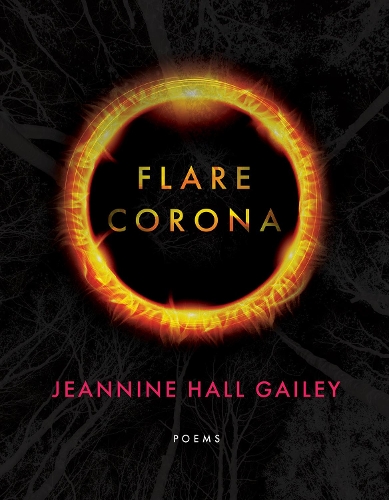
Flare, Corona
(Paperback)
Publishing Details
Flare, Corona
By (Author) Jeannine Hall Gailey
BOA Editions, Limited
BOA Editions, Limited
16th August 2023
United States
Classifications
General
Non Fiction
Modern and contemporary poetry / poems
811.6
Physical Properties
Paperback
104
Width 152mm, Height 228mm
Description
Against a constellation of solar weather events and evolving pandemic, Jeannine Hall GaileysFlare, Corona paints a self-portrait of the layered ways that we prevail and persevere through illness and natural disaster.
Gailey deftly juxtaposes odd solar and weather events with the medical disasters occurring inside her own brain and body we follow her through a false-alarm terminal cancer diagnosis, a real diagnosis of MS, and finally the onset of the coronavirus pandemic. The solar flare and corona of an eclipse becomes the neural lesions in her own personal flare, which she probes with both honesty and humor. While the collection features harbingers of calamity, visitations of wolves, blood moons, apocalypses, and plagues, at the center of it all are the poets attempts to navigate a fraught medical system, dealing with a series of challenging medical revelations, some of which are mirages and others that are all too real.
InFlare, Corona, Jeannine Hall Gailey is incandescent and tender-hearted, gracefully insistent on teaching us all of the ways that we can live, all of the ways in which we can refuse to do anything but to brilliantly and stubbornly survive.
Reviews
Who knew the apocalypse could be so fun Jeannine Hall Gailey, thats who. Our trenchant speaker, who wrote a nuclear winter poem when I was seven, now in mid-life finds herself smack dab in the eye of a perfect storm: a mistaken terminal cancer diagnosis resolves itself into an MS diagnosis accessorized with a coronavirus crown. Yet these poems are deeply life-affirming, filled with foxes and fairytales and fig trees. Flare, Corona is a surprising, skilled, and big-hearted book.
Beth Ann Fennelly, author of Heating & Cooling: 52 Micro-Memoirsand Poet Laureate of Mississippi
Everything really is connected is what I kept thinking as I read Jeannine Hall Gaileys Flare,Corona. In it, the ecological crisis we face is felt in the marrow of the body, and chronic illness becomes a phrase to characterize not only a human condition but our global one. Yet HallGailey faces personal and societal illness with characteristic deep feeling and humor, and I wasstruck by the search for hope and optimism undergirding these inviting, image-rich poems:Look to the futureperhaps that glow you see isnt fire, but sunrise.
Dana Levin, author of Now You Do Know Where You Are
The milieu of Flare, Corona, is at once literal and metaphorical: what blooms in the water and soil of Oak Ridge, Tennessee, ultimately blooms in the bodies of those who grew up there. This collection effortlessly toggles between what feels endangered in the macro-political scale of contemporary American society, and in the micro-medical reality of our speaker: My first flare came on the week of the solar eclipse / when the shadow fell cold over us, and the birds stopped singing. Whats astonishing about this collection is how the poet showcases her trademark dark humor and vivid hyperboleall the while pulling the reader in close to consider, frankly and with earned insight, the experience of chronic illness. Crafty uses of parallel structure and self-portraiture elevate personal narratives into poems that will outlive any apocalypse. This is an immersive, terrific read.
Sandra Beasley, author of Made to Explode
We all have bodies that we know will fail on us, and we live in a world we know is riven by troubles. But how few of us really reckon with the bodysand the body politicsfailures until disaster strikesfor us or for a loved one. Flare, Corona is full of these dark facts, as Jeannine Hall Gailey grapples with her own illness and with an America, maybe a world, that seems to be falling apart. Yet in poem after full, fast, lush poem, Gailey keeps turning disaster into light, not at all to falsify the very real darkness, but to turn ethical, engaged attention to what is. This book is full of a life insisting on its own richness, carried out in spite of what cant be avoided.
Daisy Fried, author of The Year the City Emptied
Author Bio
Jeannine Hall Gaileyserved as the second Poet Laureate of Redmond, Washington. She's the author of five other books of poetry: Becoming the Villainess, She Returns to the Floating World, Unexplained Fevers, The Robot Scientists Daughter, andField Guide to the End of the World, winner of the Moon City Press Book Prize and the SFPA's Elgin Award. Shes also the author of PR for Poets, a non-fiction guide to help poets publicize their books. Her work has been featured on The Writers Almanac, Verse Daily, and The Best Horror of the Year. She holds a B.S. in Biology and an M.A. in English from University of Cincinnati, and an MFA from Pacific University. Her poetry has appeared in journals like The American Poetry Review, Ploughshares, and Poetry; her personal essays have appeared on Salon.com and The Rumpus.
